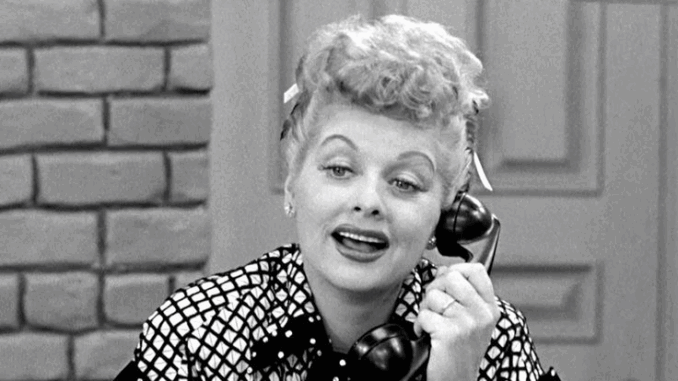
Lucille Ball’s iconic role as Lucy Ricardo in I Love Lucy not only made her one of the most beloved actresses in television history but also solidified her place as a trailblazer in the entertainment industry. Beyond her comedic genius and timeless performances, Lucille Ball’s contributions to television, both on and off the screen, reshaped the landscape of Hollywood and forever altered the way TV shows were made. Her legacy in I Love Lucy continues to influence generations of actors, writers, and producers, making her a pioneer in more ways than one.
A Groundbreaking Comedic Talent
At the heart of I Love Lucy’s enduring success is Lucille Ball’s unrivaled comedic talent. With impeccable timing, a fearless approach to physical comedy, and a natural ability to bring humor into every situation, Ball created a character that transcended the typical sitcom housewife of the era. Lucy Ricardo, while often caught in hilariously absurd situations, was also relatable—a woman with big dreams and a strong sense of determination.
Ball’s performances in scenes like the famous chocolate conveyor belt episode or her grape stomping antics in Italy became legendary, showcasing her ability to mix slapstick comedy with genuine emotion. She knew how to make the audience laugh, but she also made them care about her character. This combination of humor and heart is part of why I Love Lucy remains so beloved, and it’s all thanks to Ball’s extraordinary skill.
Breaking Barriers in Television
Lucille Ball’s impact extended far beyond her acting chops. As one of the first women to have a major creative role in television production, Ball helped break down the gender barriers that existed in Hollywood during the 1950s. She and her real-life husband, Desi Arnaz, co-founded Desilu Productions, which produced I Love Lucy and many other successful shows. Their partnership was groundbreaking, particularly at a time when women were rarely seen in positions of power behind the scenes in TV.
Ball was instrumental in shaping the show’s production style. She demanded the use of multiple cameras, a decision that would change the future of sitcoms by creating a more dynamic and engaging viewing experience. She also ensured that the show would be filmed on 35mm film rather than the standard 16mm used for television at the time, ensuring higher quality and making the series suitable for reruns. This decision was revolutionary and helped establish I Love Lucy as a show that would live on long after its initial broadcast.
A Model for Women in the Entertainment Industry
Lucille Ball’s leadership at Desilu Productions paved the way for future generations of women in television. At a time when female producers and executives were a rarity, Ball showed that women could not only perform but also run the show. Desilu Productions went on to produce iconic series like Star Trek and The Untouchables, and Ball’s influence helped prove that women could thrive in the male-dominated world of television production.
Her role as a businesswoman and a creative force made her an inspiration for countless women in the industry. Ball was a role model for those who aspired to follow in her footsteps, proving that talent and determination could lead to success, even in an industry that had little room for women in leadership roles.
The Cultural Impact of I Love Lucy
While Ball’s behind-the-scenes contributions were significant, her cultural impact was equally profound. The groundbreaking portrayal of an interracial marriage between Lucy and Ricky Ricardo, played by Desi Arnaz, was revolutionary for its time. Despite some initial resistance from networks and advertisers, the couple’s chemistry on-screen proved that audiences were ready for a portrayal of a multicultural relationship. The success of I Love Lucy paved the way for more diverse representation in television, influencing the portrayal of relationships in future shows.
Beyond its social impact, I Love Lucy also reflected the universal themes of family, friendship, and the pursuit of one’s dreams. Lucy’s endless schemes to get into show business, her loyalty to her husband Ricky, and her genuine love for her friends, Ethel and Fred, created a relatable and heartwarming portrayal of domestic life.
The Enduring Influence
Even decades after I Love Lucy ended its original run in 1957, Lucille Ball’s legacy continues to shine brightly. Reruns of I Love Lucy remain a staple of television programming, reaching new generations of viewers and introducing them to Ball’s unmatched comedic brilliance. Her influence extends beyond just the show; many modern comedians, including Carol Burnett, Tina Fey, and Amy Poehler, have cited Ball as a major inspiration.
In 2020, Lucille Ball’s legacy was further cemented with the release of the film Being the Ricardos, which explored her life and career in more detail. The film, starring Nicole Kidman as Lucille Ball, sparked renewed interest in the actress’s remarkable story and her contributions to television.
Conclusion
Lucille Ball’s legacy in I Love Lucy is far-reaching and enduring. As an actress, producer, and visionary, she revolutionized television and paved the way for future generations of women in the entertainment industry. Her comedic genius and groundbreaking work behind the scenes have left an indelible mark on TV history. Today, Lucille Ball’s contributions are still celebrated, ensuring that her place in television history remains secure and her influence continues to shape the medium for years to come.
